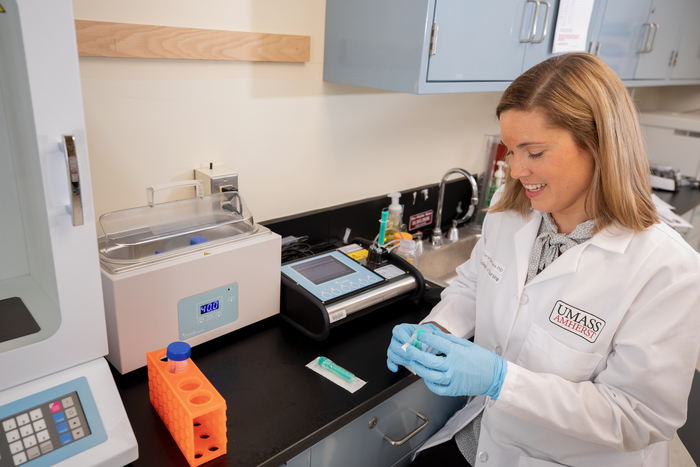Carrie-Ellen Briere studies the cells in human milk, a passion inspired by years of working as a clinical nurse with sick and premature babies in the neonatal intensive care unit (NICU).

Credit: John Solem/UMass Amherst
Carrie-Ellen Briere studies the cells in human milk, a passion inspired by years of working as a clinical nurse with sick and premature babies in the neonatal intensive care unit (NICU).
The University of Massachusetts Amherst assistant professor of nursing is researching whether fresh breast milk can be shown to provide more benefits to NICU babies than breast milk pumped from the mother that has been refrigerated or frozen. She’s also advancing research that suggests in animal models that breast cells can act like stem cells, turning into functioning cells in such organs as the liver and brain.
To pursue her lab research mentored by a team of veteran UMass Amherst professors, Briere has been awarded a five-year, $730,000 career development grant from the National Institutes of Health’s (NIH) National Institute of Child Health and Human Development.
“A typical newborn breastfeeds directly at the breast, so they’re getting milk right as nature intended,” Briere says. “When babies are in the NICU, moms usually have to pump milk that we refrigerate or freeze because not all the babies who are born early or are sick can eat it right away so we save it for later use. Many preterm infants also have extra nutrients added into milk, so their milk is often prepared in bulk at a set time of day, instead of individually at feedings with fresh milk.
“We know that human milk is protective and beneficial for infants both in the NICU and afterwards, but we’re not quite sure how storing impacts different components of the milk we’re giving to babies and whether it may be taking away some of its beneficial properties.”
Briere is being mentored by an interdisciplinary UMass Amherst team, including breast milk and breast cancer researchers Kathleen Arcaro and D. Joseph Jerry, both professors of veterinary and animal sciences; and nutrition scientist David Sela, associate professor of food science and director of the Fergus M. Clydesdale Center for Foods for Health and Wellness. (Briere is also working with Sela in his NIH-funded investigation into how nitrogen in human milk is used by beneficial microbes in the infant gut.) In addition to the UMass Amherst researchers, Dr. Laura Madore, an assistant professor of pediatrics at UMass Medical School-Baystate and attending neonatologist at Baystate Children’s Hospital, is another member of Briere’s guiding team.
Briere will conduct experiments using fresh, refrigerated and frozen human milk and compare their impacts on lab-based intestinal cells in which an infection has been introduced. “We want to prioritize using fresh milk in the NICU but there are a lot of barriers to that,” she says. “Having actual data showing that having fresh milk is best would help change clinical practice to make sure our sickest little babies are getting the best milk possible, especially early in their life when they’re most vulnerable.”
One way to make that happen, she says, is by coordinating family visit times with feeding times.
In related research, Briere will design new studies in animal models that examine how specific breast milk cells end up moving from the gut and transforming into functional cells in other organs. This could have significant implications for preterm babies whose organs are underdeveloped, she notes.
“Studies have shown that cells in milk, when ingested in animal models, don’t just get swallowed and hang out in the gut,” Briere says. “They actually are finding milk cells in various organs throughout the mouse pups. Somehow the milk cells are traveling through the digestive system and landing in some specific organs as actual functioning cells.”




